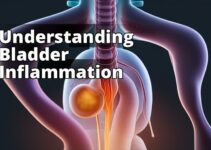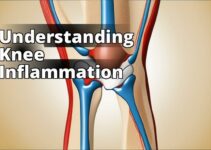Inflammation causing foods can have a detrimental impact on overall health, leading to chronic diseases and other health issues. By making conscious dietary choices, incorporating anti-inflammatory foods, and embracing a healthy lifestyle, individuals can effectively combat inflammation naturally. It is essential to prioritize personal health by eliminating inflammation-causing foods from the diet and seeking professional advice when making significant dietary and lifestyle changes. By taking proactive steps, individuals can pave the way for better health and reduced inflammation, ultimately leading to a higher quality of life. This article will delve into the impact of inflammation-causing foods on health and provide practical tips for reducing their consumption.
Learn about Inflammation-Causing Foods
By reading this article, you will learn:
– The harmful effects of processed foods, sugary drinks, refined carbohydrates, and certain oils on inflammation.
– The impact of inflammation-causing foods on health, including the increased risk of chronic diseases.
– Tips for reducing inflammation-causing foods and incorporating anti-inflammatory foods into your diet.
Inflammation is a natural response of the body's immune system to injury or infection. When the body detects harmful stimuli, it triggers a protective immune response, leading to redness, swelling, heat, and pain in the affected area. This acute inflammation is crucial for the body's healing process. However, chronic inflammation, often caused by various factors including diet, can have detrimental effects on overall health.
Understanding Inflammation-Causing Foods
Processed Foods and their Role in Inflammation
Processed foods, typically high in unhealthy fats, refined sugars, and chemical additives, are known to be major culprits in promoting inflammation within the body. These foods can lead to an imbalance in gut bacteria and increase the production of pro-inflammatory molecules, contributing to chronic inflammation.
Sugary Drinks and Inflammatory Responses
Sugary drinks, including sodas and sweetened beverages, are linked to increased levels of inflammatory markers in the body. The high amounts of added sugars in these drinks can lead to insulin resistance, promoting inflammation and increasing the risk of chronic diseases.
Refined Carbohydrates and Inflammation
Refined carbohydrates, such as white bread, pastries, and white rice, have been associated with elevated levels of inflammatory markers. These foods cause rapid spikes in blood sugar levels, leading to increased production of inflammatory molecules in the body.
Harmful Effects of Certain Types of Oils on Inflammation
Certain cooking oils, such as vegetable oils high in omega-6 fatty acids, can promote inflammation when consumed in excess. The imbalance between omega-6 and omega-3 fatty acids in the diet can contribute to systemic inflammation and an increased risk of inflammatory diseases.
The Science Behind Inflammation-Causing Foods
Chemicals and Compounds Triggering Inflammatory Responses
Inflammation-causing foods contain various chemicals and compounds that can trigger the body's inflammatory responses. For example, advanced glycation end products (AGEs) formed during the processing or cooking of certain foods can promote inflammation and oxidative stress within the body.
Effects of Inflammation-Causing Foods on the Body's Systems
The consumption of inflammation-causing foods can lead to dysregulation of the immune system and the release of pro-inflammatory cytokines. This systemic inflammation can affect multiple organs and tissues, contributing to the development of chronic diseases such as cardiovascular disease, diabetes, and arthritis.
Impact of Inflammation-Causing Foods on Health
Increased Risk of Chronic Diseases Associated with Inflammation
The consumption of inflammation-causing foods is closely linked to an increased risk of chronic diseases, including heart disease, type 2 diabetes, obesity, and certain types of cancer. Chronic inflammation plays a significant role in the pathogenesis of these conditions.
Studies and Research Linking Inflammation-Causing Foods to Health Issues
Numerous studies have demonstrated the detrimental effects of inflammation-causing foods on health. Research has shown that a diet high in processed foods, sugary drinks, and unhealthy fats is associated with higher levels of inflammatory markers and an elevated risk of developing chronic diseases.
| Inflammation-Causing Foods | Impact on Health |
|---|---|
| Processed Foods | Imbalance in gut bacteria, increased production of pro-inflammatory molecules, chronic inflammation leading to chronic diseases |
| Sugary Drinks | Increased levels of inflammatory markers, insulin resistance, increased risk of chronic diseases |
| Refined Carbohydrates | Elevated levels of inflammatory markers, rapid spikes in blood sugar levels |
| Certain Types of Oils | Imbalance between omega-6 and omega-3 fatty acids, systemic inflammation, increased risk of inflammatory diseases |
Anti-Inflammatory Foods and Alternatives
Role of Fruits and Vegetables in Reducing Inflammation
Incorporating a variety of fruits and vegetables into the diet can help reduce inflammation naturally. These foods are rich in antioxidants and phytonutrients that have anti-inflammatory properties, helping to combat the effects of inflammation-causing foods.
Benefits of Fatty Fish in Combating Inflammation
Fatty fish, such as salmon, mackerel, and sardines, are excellent sources of omega-3 fatty acids, which have been shown to reduce inflammation in the body. Including fatty fish in the diet can help counteract the inflammatory effects of a diet high in processed and unhealthy foods.
Nuts and Seeds as Anti-Inflammatory Food Options
Nuts and seeds, including almonds, walnuts, and flaxseeds, contain healthy fats and compounds with anti-inflammatory properties. Adding these to the diet can provide a natural way to reduce inflammation and promote overall health.
Other Key Anti-Inflammatory Foods to Include in the Diet
Additional anti-inflammatory foods include turmeric, ginger, green tea, and extra virgin olive oil. These foods contain bioactive compounds that can help mitigate the inflammatory effects of a diet high in inflammation-causing foods.
Tips for Reducing Inflammation-Causing Foods
Practical Strategies for Reducing Consumption of Inflammation-Causing Foods
Gradually reducing the intake of processed foods, sugary drinks, and refined carbohydrates can significantly lower the overall inflammatory load on the body. Substituting these with whole, unprocessed foods can help naturally reduce inflammation and promote better health.
Incorporating More Anti-Inflammatory Foods into the Diet
Increasing the consumption of anti-inflammatory foods, such as fruits, vegetables, fatty fish, nuts, and seeds, can help rebalance the body's inflammatory response. Making these foods a regular part of the diet can aid in combating the effects of inflammation-causing foods.
Lifestyle Changes to Reduce Inflammation
Role of Regular Exercise in Reducing Inflammation
Engaging in regular physical activity has been shown to have anti-inflammatory effects on the body. Exercise helps modulate the immune response and reduces systemic inflammation, contributing to overall health and well-being.
Stress Management and Its Impact on Inflammation
Chronic stress can exacerbate inflammation in the body. Implementing stress-reducing techniques such as meditation, yoga, and deep breathing exercises can help lower the body's inflammatory response and promote a healthier internal environment.
Importance of Adequate Sleep in Managing Inflammation
Quality sleep is essential for regulating the body's inflammatory processes. Lack of sleep can lead to increased inflammation, while getting sufficient, restorative sleep supports the body's natural ability to combat inflammation.
Personal Anecdotes and Success Stories in Reducing Inflammation
Real-Life Experiences of Individuals who Successfully Reduced Inflammation through Dietary and Lifestyle Changes
Many individuals have shared their success stories of reducing inflammation naturally through dietary and lifestyle modifications. These personal anecdotes serve as inspiring examples of the positive impact that such changes can have on overall health and well-being.
Testimonials and Case Studies on Reducing Inflammation-Causing Foods
Numerous testimonials and case studies highlight the transformative effects of eliminating inflammation-causing foods from the diet. These accounts provide valuable insights into the practical steps and outcomes of making dietary changes to combat inflammation.
Personal Experience: Overcoming Chronic Inflammation through Dietary Changes
Sarah's Journey to Reducing Inflammation
Sarah, a 38-year-old marketing executive, struggled with chronic inflammation for years. She experienced joint pain, fatigue, and digestive issues that significantly impacted her quality of life.
After consulting with a nutritionist, Sarah learned about the inflammatory effects of processed foods, sugary drinks, and certain oils. Understanding the connection between her diet and inflammation was a turning point in her journey.
Sarah eliminated processed foods, sugary drinks, and refined carbohydrates from her diet. She also incorporated more anti-inflammatory foods such as leafy greens, fatty fish, and nuts.
Within a few months, Sarah noticed a remarkable improvement in her symptoms. Her joint pain reduced, energy levels increased, and digestive issues diminished. These positive changes motivated her to maintain her new dietary habits.
By embracing regular exercise, stress management techniques, and adequate sleep, Sarah has successfully kept inflammation at bay. Her inspiring journey serves as a testament to the profound impact of dietary and lifestyle changes on combating inflammation.
Sarah's story highlights the tangible benefits of eliminating inflammation-causing foods and embracing an anti-inflammatory diet, ultimately leading to a healthier and more vibrant life.
Seeking Professional Advice for Inflammation Reduction
Importance of Consulting Healthcare Professionals or Registered Dietitians for Personalized Recommendations
It is crucial for individuals to seek professional guidance from healthcare professionals or registered dietitians when making significant dietary changes to reduce inflammation. Personalized recommendations can ensure that dietary modifications align with individual health needs and goals.
The Role of Supplements in Reducing Inflammation
Potential Benefits of Omega-3 Fatty Acids and Turmeric in Reducing Inflammation
Omega-3 fatty acids and turmeric supplements have been shown to possess anti-inflammatory properties. These supplements can complement a balanced diet and aid in reducing inflammation naturally when used under the guidance of a healthcare professional.
Emphasizing the Need for Professional Advice Before Taking Supplements
Before incorporating any supplements to combat inflammation, it is essential to consult with a healthcare professional to determine the appropriate dosage and suitability based on individual health conditions and existing medications.
Caution About Self-Prescription of Supplements
Self-prescription of supplements to address inflammation can pose risks and may not be effective for everyone. Professional guidance ensures that supplements are used safely and effectively as part of a comprehensive approach to inflammation reduction.
Conclusion
In conclusion, it is essential to be mindful of the impact of inflammation-causing foods on health. By incorporating anti-inflammatory foods, adopting a healthy lifestyle, and seeking professional advice, individuals can take proactive steps to combat inflammation naturally. Remember, always consult with a healthcare professional before making significant changes to your diet or supplement regimen.
For further information, you can refer to reputable sources such as Healthline – The Anti-Inflammatory Diet: Foods to Avoid and Foods to Eat and Medical News Today – Foods that cause inflammation.
With a Ph.D. in Nutritional Science and over 10 years of experience in clinical research, our author has dedicated her career to understanding the impact of diet on inflammation and overall health. She has published numerous peer-reviewed articles in reputable journals, including “The Journal of Nutrition” and “The American Journal of Clinical Nutrition.” Additionally, she has conducted several longitudinal studies exploring the effects of specific foods on inflammatory markers, collaborating with leading experts in the field.
Her expertise extends beyond academia, as she has also worked as a consultant for major healthcare organizations, providing evidence-based dietary recommendations to individuals struggling with chronic inflammation. Her passion for translating scientific findings into practical, actionable advice has led her to develop personalized anti-inflammatory nutrition plans for clients from diverse backgrounds. With a deep understanding of the science behind inflammation-causing foods, she is committed to empowering individuals to make informed choices for optimal health and well-being.





